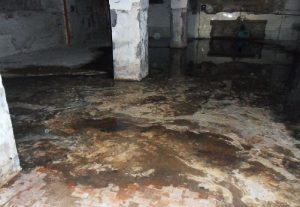When a sewer system is overwhelmed with large amounts of water or foreign items, sewer backup can occur, causing substantial damage to the buildings it services. Typically, the effects of this problem are seen in the form of a backup of water and sewage in the basement of a structure. In addition to being extremely difficult and messy to clean up, sewer damage poses risks such as contaminated drinking water and contamination and loss of many porous materials. If you experience a sewer backup, take immediate action in order to salvage affected surfaces, reduce the spread of illness, and restore safety to the area.
In the Event of Sewage Backup:
- Do not flush toilets
- Keep children and animals away from contaminated areas and out of the home if possible
- Be sure to disconnect your power to prevent electrocution if the area of backup contains electrical lines or outlets
- Immediately report the problem to your sewage department
- Consider contacting a professional sewer restoration service to assist with water extraction and cleanup
- Take pictures of the contaminated area
- Keep track of any damaged and/or discarded items for insurance purposes
- Check your insurance policy or contact your agent to determine if sewage backups/damage is covered
Sewage Cleanup
Some homeowners decide to take on the task of sewage cleanup themselves, and while it is a difficult job that may cause gastrointestinal illness, respiratory issues, and infections, it can be done. If you plan on ridding your home of this mess without professional help, do consider hiring a sewer restoration service to assess the damage and advise you about rectifying each problem area. Before cleanup, be sure that you guard yourself with protective eyewear, long gloves, and boots. Cover all open wounds or cuts with bandages. Be sure to follow these steps during cleanup:
- Use a wet vacuum, sump pump, or mop and bucket to eliminate all standing water from the area
- Place any solid waste into heavy-duty trash bags
- Discard soft or porous materials and items that have come into contact with raw sewage
- Allow area to dry completely- opening windows or using powerful fans will expedite this process
- Mix 1 part bleach with 9 parts water in a large bucket
- Hose down contaminated area and apply bleach mixture with a mop
- Allow treated area to dry completely
- Repeat bleach mix if necessary
Don’t Delay Cleanup
Sewage backup is a serious problem that when not cleaned up immediately and properly can devastate your property and cause widespread illness to anyone living there. If you have sewage backup, start the cleanup process immediately. ServiceMaster of Greater Pittsburgh specializes in sewage cleanup and restoration with 24/7 emergency response teams ready to clean up the mess and make your home safe again. To get assistance with sewage backup, or for more information, contact us at 412-826-1010.
